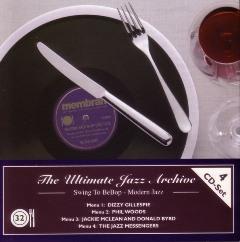The Ultimate Jazz Archive Vol.127 – Jackie McLean & Donald Byrd [1955] [2005]
The Ultimate Jazz Archive Vol.127 – Jackie McLean & Donald Byrd [1955] [2005]

01.It’s You Or No One 02.Blue Doll 03.Little Melonae 04.The Way You Look Tonight 05.Mood Malody 06.Lover Man
Jackie McLean has long had his own sound, played slightly sharp and with great intensity; he is recognizable within two notes. McLean was one of the few bop-oriented players of the early '50s who explored free jazz in the '60s, widening his emotional range and drawing from the new music qualities that fit his musical personality.
The son of guitarist John McLean (who played guitar with Tiny Bradshaw), Jackie started on alto when he was 15. As a teenager he was friends with such neighbors as Bud Powell, Thelonious Monk, and Sonny Rollins. He made his recording debut with Miles Davis in 1951 and the rest of the decade could be considered his apprenticeship. McLean worked with George Wallington, Charles Mingus, and Art Blakey's Jazz Messengers (1956-1958). He also participated on a string of jam session-flavored records for Prestige and New Jazz which, due to the abysmal pay and his developing style, he later disowned. Actually they are not bad but pale in comparison to McLean's classic series of 21 Blue Note albums (1959-1967). On sessions such as One Step Beyond and Destination Out, McLean really stretches and challenges himself; this music is quite original and intense yet logical. McLean also appeared as a sideman on some sessions for Blue Note (most notably with Tina Brooks, acted in the stage play The Connection (1959-1961), and led his own groups on a regular basis. By 1968, however, he was moving into the jazz education field and other than some SteepleChase records from 1972-1974 (including two meetings with his early idol Dexter Gordon) and an outing for RCA (1978-1979), McLean was less active as a player during the '70s. However in the '80s Jackie McLean returned to a more active playing schedule (sometimes with his son René McLean on tenor), recording for Triloka, Antilles, and most recently (with a renewed relationship) with Blue Note -- without losing the intensity and passion of his earlier days. ---Scott Yanow, Rovi
In the aftermath of Clifford Brown’s tragic death in 1956, many Jazz observers spent fruitless hours looking for likely successors, just as they had done when Charlie Parker had died the previous year. Donald Byrd was 24 years old and the most likely candidate.
Born on Dec. 9, 1932 in Detroit, Byrd studied trumpet and composition and graduated from Wayne State University in 1954. He arrived in New York in 1955 to complete an MA at the Manhattan School of Music and his elegant musical imagination and his beautiful tone quickly brought him to the attention of the established New York Jazz scene and record companies. Amongst others he worked with Sonny Rollins, Max Roach, Jackie McLean and Thelonious Monk. His big break came in 1956 when he briefly joined Art Blakey's Jazz Messengers where he was the successor of Clifford Brown and Kenny Dorham and the predecessor to Lee Morgan. By 1958 Byrd was co-leading a group with Pepper Adams, which lasted until 1961 and made many fine recordings. In 1959, Byrd discovered Herbie Hancock in Chicago and recorded a number impressive dates for Columbia and Blue Note in the '60s, including Free Form and New Perspectives.
In the early 60s Byrd did groundbreaking work in the education field, introducing Jazz courses, which were until then virtually unknown at many US Universities and Conservatories. He also pursued his education as a composer, which took him to Europe where, in 1963, he completed a course with the classical teacher and composer Nadia Boulanger. Gradually Byrd became one of the most respected authorities on American music studies teaching at some of the USA’s most important seats of learning and in 1982, he received his doctorate from Columbia Teachers College.
In the 70s Byrd tasted commercial success when he helped launch the jazz/funk era with his seminal albums, Black Byrd, Street Lady and Places and Spaces. Byrd created and produced The Blackbyrds, a combo composed of musicians he taught at Howard University in the early '70s and who took the formula further to chart success. Byrd would repeat that formula with N.C.C.U from North Carolina Central University. After several funk forays in the early '80s on Elektra records, Byrd suffered a stroke but rehabilitated himself to record a few straight Jazz projects for the Landmark label. In the late 80s Byrd had reverted to his hard-bop style of the late 50s. --- vervemusicgroup.com
download: uploaded anonfiles yandex 4shared solidfiles gett mega filecloudio








